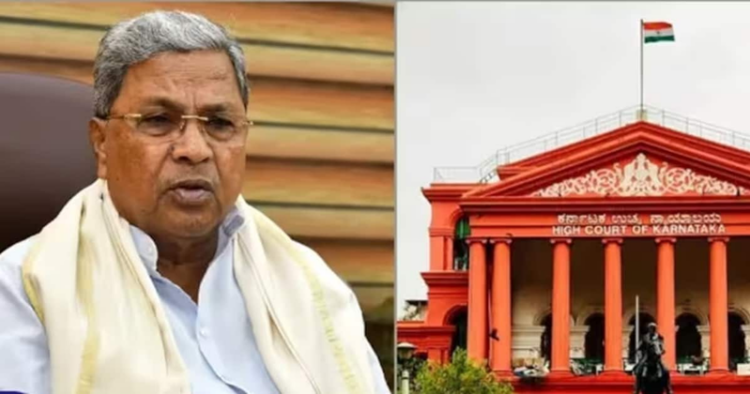BENGALURU: The state high while delivering judgment in connection with Chief Minister Siddaramaiah’s plea noted that his wife is a beneficiary in the Mysore Urban Development Authority (MUDA) land scam. This action stems from a controversial case concerning the allocation of 14 high-value replacement plots. The case has raised legal and political questions, resulting in an order by the Karnataka High Court that upholds the Governor’s prior approval for the investigation into the matter.
The investigation focuses on allegations of misconduct by the Chief Minister in influencing MUDA officials to illegally allocate replacement plots. The High Court, while maintaining the Governor’s order, framed and answered eight critical legal questions, culminating in a summary judgment that provides clarity on the legality of the investigation against Siddaramaiah.
During the proceedings, the High Court framed eight pivotal questions that were key to determining the legitimacy of the Governor’s prior approval for investigating the Chief Minister. These questions addressed constitutional issues, the role of the Governor, and the provisions of the Prevention of Corruption Act (PC Act), especially Section 17A, which deals with the requirement for prior permission before prosecuting public servants.
The case presented several complex legal arguments regarding whether the Governor’s actions in granting permission for an investigation were constitutional and whether the necessary procedures were followed. The High Court provided its findings in a detailed judgment summarizing the situation in 11 key points.
Summary of the Judgment: 11 Key Points
1. Justifiability of Complaint : The complaint filed and the action seeking prior permission from the Governor for investigation was deemed valid and justifiable.
2. Section 17A of PC Act: Prior approval under Section 17A of the Prevention of Corruption Act is mandatory in cases involving public officials. This provision ensures that no investigation can be initiated without this critical step.
3. Private Complaint Responsibility: In private complaints under Section 223 of the Criminal Procedure Code (CrPC), it is the complainant’s responsibility to seek prior permission for the investigation, not that of the police.
4. Governor’s Discretion: While the Governor generally acts on the advice of the Cabinet per Article 163 of the Constitution, he may make independent decisions in exceptional circumstances. This case, the court ruled, qualifies as such.
5. Independent Decision Valid: The High Court found no fault with the independent decision taken by the Governor in granting permission for the investigation.
6. Recording of Reasons: The decision-making authority, in this case, the Governor, is only required to record the reasons for the decision. Those reasons must be documented on file and cannot be newly introduced in court.
7. Non-Arbitrary Action: The Governor’s order was not arbitrary, and the court found that it was made with full discretion.
8. Discretion Properly Exercised: The Governor’s decision was ruled to have been made with complete discretion, following due process.
9. Hearing Not Mandatory: Providing a hearing before granting prior permission for investigation under Section 17A is not mandatory. However, the Competent Authority has the discretion to offer it if deemed necessary.
10. Allegations of Hastiness: The court dismissed claims that the Governor’s decision was rushed, noting that this does not invalidate the entire order.
11. Investigation Warranted: The court found that the beneficiary in this case was not an outsider but the Chief Minister’s wife. This strengthens the argument that an investigation is necessary.
The controversy involves the illegal allocation of 14 replacement plots valued at Rs 56 crore. These plots were allegedly given in place of 3 acres and 16 gunte of land from survey number 464 in Kesare village, Mysore. The complaint suggests that Chief Minister Siddaramaiah used his influence to manipulate MUDA officials to sanction this exchange, resulting in substantial financial benefits.
Prominent social activists and legal figures, including T.J. Abraham, Snehamai Krishna, and JDS Legal Unit President SP Pradeep Kumar, had approached the Governor in June-July, seeking permission to investigate and prosecute the Chief Minister.
On August 17, the Governor approved an investigation into the allegations. However, Siddaramaiah challenged this decision in the Karnataka High Court on August 19, filing a petition seeking a stay on the Governor’s order. Siddaramaiah’s counsel argued for an injunction, while the counsel representing the respondents objected.
After considering the arguments from both sides, the High Court issued an interim order. The court instructed the Special Court for People’s Representatives and the Lokayukta Police to refrain from taking any immediate action against the Chief Minister based on the prosecution. The case remained under judicial scrutiny until the hearing was concluded on September 12, after which the court reserved its judgment.
The High Court’s detailed response to the questions surrounding this case marks a critical phase in the legal process involving Chief Minister Siddaramaiah. The court’s decision upholds the Governor’s permission for a preliminary investigation, affirming that the case merits further scrutiny. With the inquiry expected to proceed, the political and legal implications of this judgment will likely continue to reverberate across Karnataka’s political landscape.



















Comments